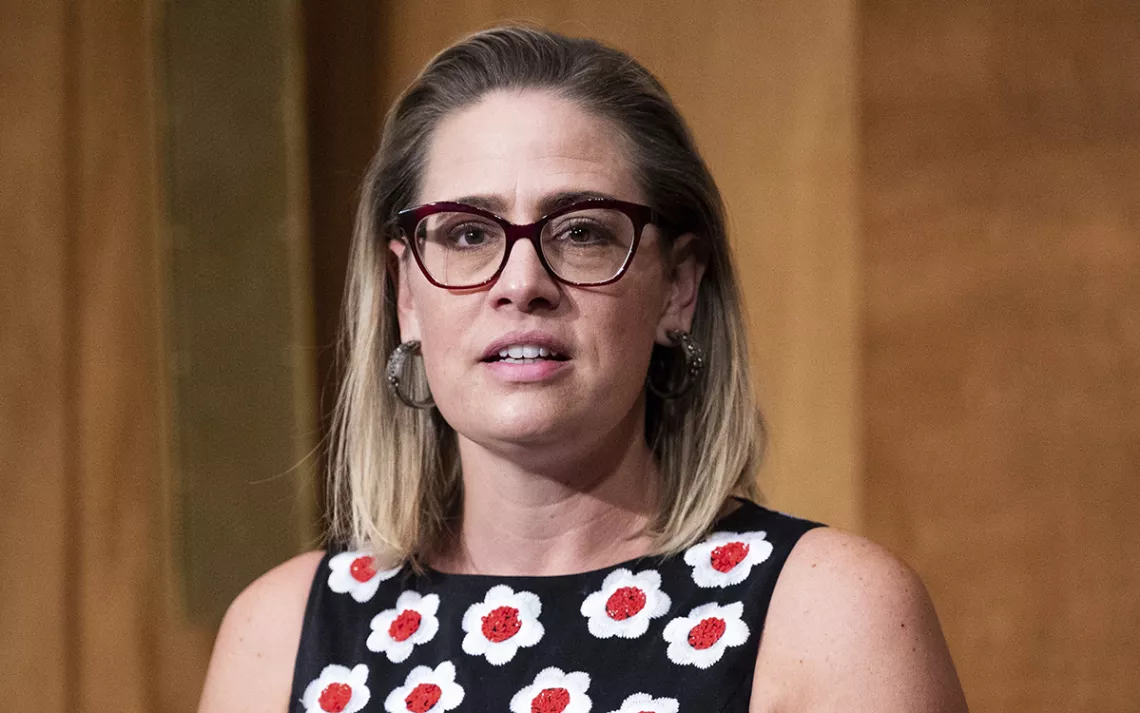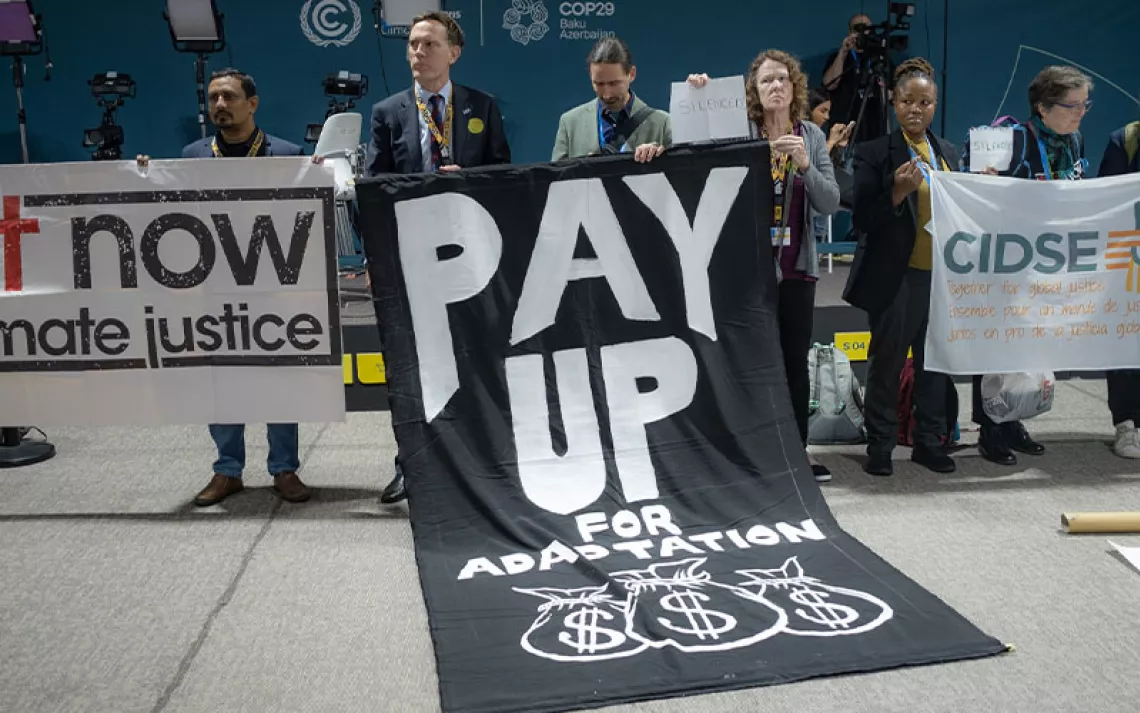Arizonans to Senator Sinema: The Climate Crisis Can’t Wait
Environmentalists urge the senator to support the Build Back Better legislation

Photo by Michael Brochstein/Sipa USA (Sipa via AP Images)
Residents of the desert state of Arizona are already feeling the heat from climate chaos. The sprawling metropolis of Phoenix is the second-fastest warming city in the country, and in 2020 it posted a record-number 144-plus days with a high temperature over 100 degrees. The state, along with the Southwest as a whole, is in the midst of a mega drought, with water levels on the Lower Colorado River—the source of water for some 40 million people—at an all-time low. Arizona wildfires are becoming bigger and hotter due to the high temps and low precipitation.
So, it should come as no surprise that climate activists in the state are fuming at lawmakers' inaction when it comes to climate change in the Grand Canyon State. A major source of frustration is Senator Kyrsten Sinema, the Arizona Democrat who in the past two months has emerged as a major obstacle to passing President Biden’s Build Back Better legislation.
Biden’s original $3.5 trillion investment package would have created a fast track toward 100 percent clean energy, invested in public transportation and union-built electric vehicles, created a Civilian Climate Corps, and replaced lead pipes in communities across the country. But conservative Democratic senators Sinema and Joe Manchin of West Virginia were unsupportive of that bold vision—and forced a renegotiation. President Biden released a new legislative framework last Thursday for a $1.75 trillion bill. While important policy levers like the proposed Clean Electricity Performance Program have been cut, the proposed legislation still includes $555 billion in climate investments. That would make it the largest US investment in climate action in history. Among those investments are $320 billion in tax credits for renewable energy developers, expanded incentives for people who buy electric vehicles, new investments in clean mass transit, and the creation of a Climate Conservation Corps.
Arizona environmentalists have been working feverishly to get Senator Sinema’s attention and to get her to confirm she’ll support the Build Back Better legislation. “I think people are frustrated and disappointed and want Senator Sinema to demonstrate that she meant what she said when she was concerned about climate,” said Sandy Bahr, director of the Sierra Club’s Grand Canyon Chapter.
Last week, members of the Sunrise Movement spent several days camped out in front of her Phoenix office. And some Sunrise Movement members from Arizona traveled to the nation’s capital to put pressure on legislators. "I'm here today because I'm mad as hell,” Sunrise Movement activist Brian Macias said at a rally last Wednesday in Washington, DC. “People in my village will feel the impact of climate change, but my senator, Kyrsten Sinema, does not care about the little people."
In September, the Sierra Club and other organizations including Mi Familia Vota and Moms Clean Air Force-Ecomadres delivered a petition with 1,300 signatures to Arizona senators Sinema and Mark Kelly, also a Democrat, urging them to support a climate-focused Build Back Better Act.
For her part, Sinema has told The Arizona Republic, “We know that a changing climate costs Arizonans. And right now, we have the opportunity to pass smart policies to address it.”
But many grassroots environmentalists remain suspicious. They say that she is inaccessible to her constituents and complain that she has not held a single town-hall-style meeting since being elected to the Senate in 2018.
“Our state is experiencing the impacts of the climate crisis, just like many, but here we do have extreme drought, and because we're already an arid place, that has huge implications,” Bahr said. “Now is not the time for halfway measures. We’re way past that, and she knows that. We’re looking forward for her to come through for Arizona. So far, she has not.”
Public opinion surveys conducted in recent months show that the Build Back Better plan is supported by a large majority of Arizona voters. An August poll by Data for Progress showed that 65 percent of likely voters in the state supported the original White House plan. And a late September survey by the Global Strategy Group (which was commissioned by the Sierra Club) found that as many as 70 percent of Arizonans were in favor of the Build Back Better framework.
Nonpartisan analyses of the Biden policies provide good reasons for this broad support. If passed, the Build Back Better legislation could add new tax revenues to local economies, provide health-care savings, and boost long-term economic growth. A report by RMI found that solar and wind built this decade in the Southwest would provide about $11 billion of direct economic benefit. Analysts at the Seidman Research Institute at the W.P. Carey School of Business at Arizona State University estimate Arizona could have directly received around $83.6 billion under the original spending package, creating almost 1 million jobs in a nine-year period in the state.
Dennis Hoffman, director of the Seidman Research Institute, said if lawmakers had decided to push forward with the original $3.5 trillion package, they would’ve been able to look back years from now and say, “We made a pretty good decision.”
But Senators Manchin and Sinema focused on the price tag of the original proposal and then drew a line in the sand, saying the starting figure was too high.
“Our current political environment is both challenging and toxic,” Hoffman said. And that narrow-mindedness can go against the best interest of Arizonans and others throughout the country who can benefit from federal funds, he added.
“Arizona, frankly, benefits from injections from the federal government and has for the last five decades, at least ever since World War II,” Hoffman said. “People move here to enjoy the lifestyle, the beautiful environment that we have. We need to preserve it.”
He continued, “We need to make it better. And investments like this—I think it could certainly do that.”
 The Magazine of The Sierra Club
The Magazine of The Sierra Club



